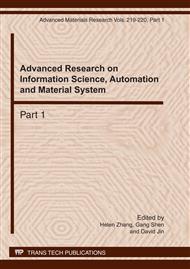[1]
Liu J.G, Zhou T. and Wang B.L. Research Development on personalized recommendation. Journal of Progress in Natural Science, Vol.19, No.1 (2009), pp.1-15.
Google Scholar
[2]
P. Resnick and H. R. Varian. Recommender systems. Communications of the ACM, 1997, Vol.40, No.3 (1997), pp.56-58.
DOI: 10.1145/245108.245121
Google Scholar
[3]
Konston J. Group Lens: applying collaborative filtering to use net news. Communication of the ACM, Vol.40, No.3 (1997), pp.77-87.
Google Scholar
[4]
Schafer, J. B, Konstan and J., Riedl J. Electronic Commerce Recommender Applications. Journal of Data Mining and Knowledge Discovery, Vol.15, No.1-2 (2001), pp.115-152.
DOI: 10.1007/978-1-4615-1627-9_6
Google Scholar
[5]
David Camacho, Daniel Borrajo and Jose M. Molina. Intelligent Travel Planning: A Multi-Agent Planning System to Solve Web Problems in the e-Tourism Domain, Autonomous Agents and Multi-Agent Systems, Vol.4, No.4 (2001), pp.387-392.
DOI: 10.1023/a:1012767210241
Google Scholar
[6]
Stanley Loh, Fabiana Lorenzi, Ramiro Saldaña and Daniel Licthnow. A tourism recommender system based on collaboration and text analysis, Information Technology & Tourism, Vol.6, No.3 (2003), pp.157-169.
DOI: 10.3727/1098305031436980
Google Scholar
[7]
Felfernig, A., Gordea, S., Jannach, D., Teppan and E., Zanker, M. A short survey of recommendation technologies in travel and tourism, OGAI Journal, Vol.26, No.2 (2006), pp.1-7.
Google Scholar
[8]
Zanker, M., Gordea, S., Jessenitschnig, M and Schnabl, M. A hybrid similarity concept for browsing semi-structured product items, Lecture Notes in Computer Science, Vol.4082, (2006), pp.21-30.
DOI: 10.1007/11823865_3
Google Scholar
[9]
Srisuwan, P. and Srivihok, A. Personalized trip information for e-tourism recommendation system based on Bayes Theorem, IFIP International Federation for Information Processing, Vol.255, (2008), pp.1271-1275.
DOI: 10.1007/978-0-387-76312-5_53
Google Scholar
[10]
Wang Y.and Ma S.C. Design and Application of Personalized Recommendation System Based on Users Behavior, Computer Systems & Applications, Vol.19, No.8 (2010), pp.29-33.
Google Scholar
[11]
Zhao Z and Feng Z.N. An adaptive algorithm of collaborative filtering recommender based on correlation similarity, Journal of Changchun University of Technology(Natural Science Edition), Vol.27, No.4 (2006), pp.354-358.
Google Scholar
[12]
Lv Y. and Yu L. Analysis and design of electronic commerce recommendation intelligent system. Agriculture Network Information, No.12 (2006). pp.75-77.
Google Scholar
[13]
Wang X.D, Wen J.J, Zhang R. and Ye J.J. Personalized Recommendation System Framework Based on Fuzzy Interest Model and Multi-Agent. Computer Systems & Applications, Vol.19, No.9 (2010), pp.183-186.
Google Scholar
[14]
Qin Hi. The Research on Core Technologies of Recommendation System in E-Commerce, Beijing: Beijing University of Technology, 2009, pp.24-30.
Google Scholar
[15]
Xu H.L, Wu X., Li X.D and Yan B.P. Comparison Study of Internet Recommendation System, Journal of Software, Vol.20, No.2 (2009),pp.350-362.
DOI: 10.3724/sp.j.1001.2009.00350
Google Scholar


